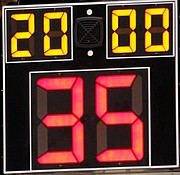THE FRONT ROW with MARK NELKE: Shot clock coming, along with questions
Idaho once again took another step — albeit a slower step — into the 21st century on Wednesday.
An overwhelming number of coaches have been in favor of a shot clock for the years, and the Idaho High School Activities Association board of control voted Wednesday to OK a 35-second shot clock, starting with the 2024 state boys and girls basketball tournaments.
What happens between now and then is anyone’s guess.
The shot clock was approved not for this coming state tournament, but for the one after that.
In the meantime, it’s up to schools to figure out how soon they will get a shot clock — or if they will — and how soon they will be used in games.
Most area schools have at least started the process of acquiring shot clocks, if not actually ordering them.
And also to be decided — during the regular season, will the use of a shot clock be a league-wide decision? Or will each school decide how the game will be played with it hosts the game? Could there be a scenario where, in a league, Team A doesn’t want to use a shot clock but Team B does, so when Team A plays at Team B, a shot clock is used, but when Team B plays at Team A, they play without a clock?
We’ll find out.
LAST SEASON, Lake City’s boys basketball team often scored in the first four seconds of a game. A shot clock wasn’t necessary to encourage the T-Wolves to shoot. But they also have a standout point guard that can keep control of the ball at the end of a quarter, if Lake City wants to hold for the last shot with the ball and much more than 35 seconds left in the quarter.
Usually, there is no need for a shot clock; most teams shoot in plenty of time, as more coaches preach up-tempo.
But at the end of quarters, and perhaps when a team was losing the momentum and looking to slow the game down, did the cries for a shot clock come up.
When that happens, as one AD who watched one of those games put it, “it went from basketball to keepaway.”
Jim Winger, who is retiring as Lake City athletic director at the end of the school year, but is remaining on as boys basketball coach for at least another season, sees both sides.
“That would certainly be great for us, don’t get me wrong, a shot clock would be awesome,” he said. “But if they’re not going to use it in the state tournament (until the 2024 tourney), I don’t see why we would use it.”
Really? Why?
“You’re getting a false positive, when you go to state and somebody doesn’t have to abide by that rule,” he said.
“People say, ‘Well, you did 3-man mechanics at state.’ Well, that’s totally different. You’re talking about a shot clock that mandates you have to play up-tempo basketball, basically. You can still milk it a little bit. But that is a controller of a game. In my book, I won’t use it for boys. If we get it up in time and James (Anderson, Lake City girls coach) wants to use it, he can.”
Craig Christensen, in his 20th year as athletic director at Post Falls High, said he's hopeful the Inland Empire League, at least, will use them in league games starting this season.
He said his school is in the process of getting shot clocks, with plans to put them in both gyms — The Arena, and the auxiliary gym.
"If I can find somebody to run them, I don’t have a problem using them for, at least, JV games," he said. "I don’t have a problem using them for lower levels if we can."
"I’m on board with using them as much as we can use them this year; I want to get going with it," he said of shot clocks. "It just makes the game so much more enjoyable; at the end of the game, you don’t get into a foul fest, it changes some of that stuff you have to do at the end of the game. You get a chance to play, and don’t get it decided by someone sitting on the free-throw line.
"All the colleges use it; when we play in Washington, they use it. So it’s a long time coming."
WHAT TOOK so long for Idaho to OK a shot clock?
Well, for one thing, it’s Idaho. Change happens slowly. But at least change has happened in recent years, examples being the aforementioned three-man officiating crews at state, and this year, using MaxPreps rankings to seed state tournaments.
Also, since the National Federation of High Schools has not approved a shot clock nationwide, it barred states that used a shot clock from having a vote on high school issues. The NFHS now allows states to have a shot clock and keep its vote on high school rules.
“Utah’s putting it (a shot clock) in next year,” Winger said. “Montana’s putting it in next year … I don’t know why we can’t put it in next year. But so be it.
“We’ll put ‘em up,” Winger said of the shot clocks. “We’ll try to get ‘em here in time and get ‘em installed, but unless somebody can talk me out of it … I don’t see why (Lake City would use one in boys games this next season).”
Once the shot clock goes into effect at state in 2024, still to be determined is if it will be mandatory during the regular season at JV and freshman games as well. That will likely be up to each team and league.
“I was 100 percent against the shot clock if it was mandatory for freshmen and JVs. We don’t have enough people (to run the shot clock at those games).
“In a weird way, a shot clock’s harder than a real clock. Because if you screw it up, the game stops and you have to reset it.”
At 3A Timberlake, retiring athletic director Tim Cronnelly said his school was looking at new scoreboards for its gym, and how shot clocks could sync up with those scoreboards.
“I think it’ll be good. I just think that’s where the game’s going,” Cronnelly said of Idaho using a shot clock. “I think, and our coaches think, it’s best for the game and best for our kids, so we’d find a way to make it happen.”
Mark Nelke is sports editor of The Press. He can be reached at 208-664-8176, Ext. 2019, or via email at mnelke@cdapress.com. Follow him on Twitter @CdAPressSports.



